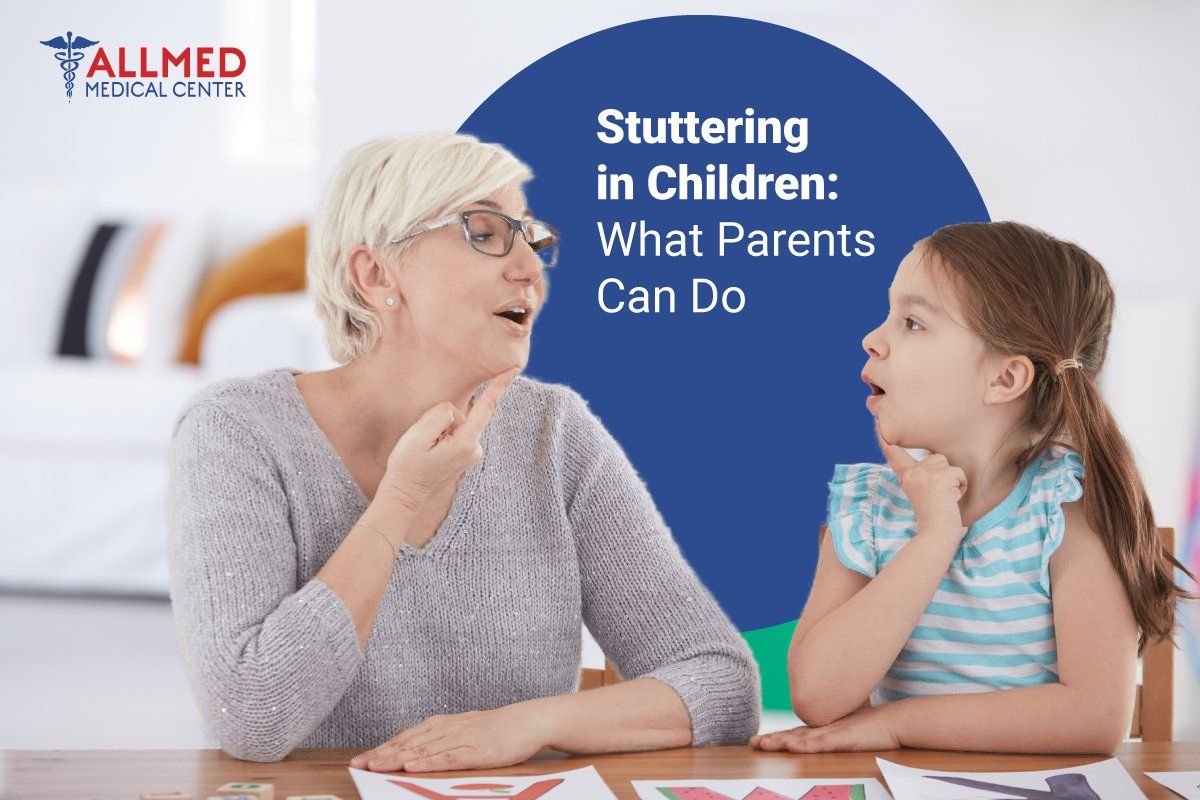Stuttering in Children: What Parents Can Do

What is Stuttering?
Stuttering, also known as stammering, is a childhood-onset fluency disorder. It is a speech disorder characterized by frequent and significant difficulties with fluency and speech flow. Toddler stuttering is common in young children between the
ages of 2 and 5. If your 3-year-old is stuttering, you don't need to worry about it. Further,
children who stutter know what they want to say, despite struggling to speak.
Also,
stuttering in kids is a part of learning to speak. When a
young child's speech and language skills are maturing to keep up with what they want to say, they may stutter.
What Are the Symptoms That Can Help You Recognize the Stuttering in Your Child?
Your first step in helping your child who stutters is to educate yourself on the disorder and how to detect it in your child.
Firstly,
development varies from child to child. Stuttering symptoms in a child are a
natural part of growing up and learning to communicate.
Secondly, more than 3 to 6 months of symptoms indicate
developmental stuttering. There can be changes in stuttering symptoms at different times of the day and in various settings.
Some of the signs and symptoms your child might be experiencing are:
- Lack of ability to initiate thought or speech
- Dragging out a word or its sounds
- Patterns of word or sound repetition
- Short pause before particular syllables or words or pauses inside a word (broken word)
- Use of filler words like "uh" to indicate impending difficulties transitioning to the next word
- Exaggerated facial or bodily expressions or motions to articulate a word.
- Fear of Public Speaking
- Insufficient capacity for meaningful exchange
Stuttering causes difficulty in communicating, which includes:
- Frequently blinking eyes
- Jaw or lip tremors
- Irritating facial movements
- Severe jolt to the head
- Balling hands into fists
What Is Stuttering Caused By?
As a parent, you can better help your child when you understand what causes stuttering. The research found the following as causes of stuttering.
1. Language Development and Stuttering
Stuttering develops between ages 2 and 5, while children's language skills develop. Many stuttering children know what they want to say, but their motor pathways still need to evolve.
Also, according to some scientists and clinicians, developmental stuttering
happens when children's speech and language abilities are unable to match the child's verbal needs.
Nevertheless, all children develop differently, but young children's rapid language development makes them prone to disfluencies.
Some children who stutter have other difficulties contributing to fluency disorders, such as speech and language impairments, ADHD, and learning challenges.
2. Genetic Influences
Stuttering children usually have stuttering relatives. Interestingly enough, research shows that identical twins had
more similar stuttering patterns than fraternal twins.
According to
research, the cause of stuttering has not been isolated to a single gene. But if you have particular genetic material, you might stammer more frequently.
3. The Environment and Emotions
As children grow aware of their stuttering,
negative sentiments about speaking can raise tension and impair their capacity to communicate further. Some children will have more emotional responses and anxiety when speaking than others, depending on their temperament.
Further, exhausting or difficult situations are
more likely to provoke an emotional response in a child, especially youngsters with a temperamental tendency to emotional reactivity. These occurrences can also be followed by an increase in speech disfluencies.
4. Activity in the Brain
Studies using brain imaging have consistently revealed variations between those who stutter and their peers who don't.
Moreover, imaging brain studies show that patients who stutter have more activity in the right hemisphere. They also have less behavior in the
left hemisphere areas that are usually in charge of making a speech. Those who stutter have more difficulty understanding what they hear and take longer to respond to sensory-motor tasks. Research has shown that when someone stammers, the language pathways in the
brain look and work differently.
5. Caused by Brain Injury
As you have learned, stuttering typically starts in childhood, when a person is still developing and learning to speak. A brain injury or severe psychological trauma in rare circumstances can cause stuttering. The reasons and manifestations of this type of stuttering, known as "acquired" stuttering, differ from those of developmental stuttering.
For instance, a
head injury can lead to the following outcomes:
- Stuttering brought on by aphasia
- Stuttering brought on by speech motor issues (apraxia of speech)
What Are Parent Strategies for Stuttering Children?
The best way to deal with stuttering is to be patient and helpful. Below are tips to help your child with stuttering:
- Refrain from instructing your child to think before speaking.
- Create a peaceful environment in the home. It would help if you tried to slow down the pace of your family life.
- Let your child complete their thoughts and sentences before quickly answering your child's questions or comments, and pause.
- Refrain from assuming that your child should always speak precisely or correctly. Let talking be fun.
- Make family meals a time for conversation. Avoid distractions like radio and television.
- Please refrain from using phrases like "slow down," "take your time," or "take a deep breath" as corrections or criticisms. However well-intended, these remarks will only make your child feel more self-conscious.
- Avoid having them speak or read aloud when your child is uncomfortable or their stuttering worsens. Instead, encourage activities that do not require much talking during these times.
- Do not interrupt your child or instruct them to begin again.
- Please speak slowly and clearly when addressing your child or others in their presence. This can help how to not stutter or reduce stuttering.
- Keep eye contact with your child. Avoid looking away or displaying signs of anger.
When to Seek Help for Your Child’s Stuttering?
Typically, developmental stuttering resolves on its own. However, you
should consider taking your child to the doctor if:
- The stuttering has been going on for almost 6 months.
- When stuttering becomes more frequent
- When tense facial and upper body muscles accompany stuttering
- When it interferes with the child's academic performance
- When it causes emotional problems, such as a phobia of specific locations or situations
- When it continues after the child has reached the age of five
Visit Your Child’s Healthcare Provider.
If you want to learn more or need assistance for your child with the stuttering issue, you are always welcome to walk into any of our sites.
Our facilities are outfitted with state-of-the-art medical technology to treat your child based on their specific needs. We are committed to providing you with all the medical services you require for your child in one location.
Call 1-8333-255-6332 to make an appointment today. The site of your choice is also listed
here.
AllMed Medical CentersServing
Greater Sacramento
Allmed Medical Center | All Rights Reserved.









